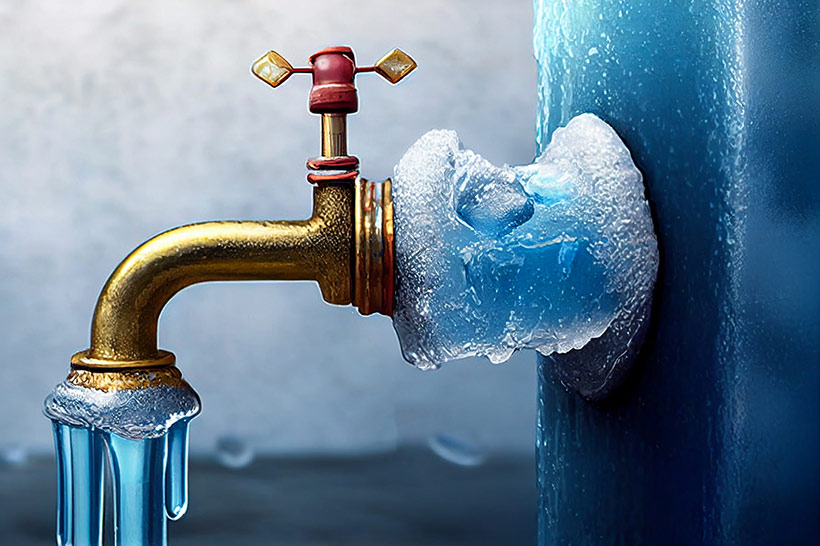Protecting Against Frozen Plumbing: Best Tips for Winter
Protecting Against Frozen Plumbing: Best Tips for Winter
Blog Article
Just how do you feel about How to prepare your home plumbing for winter weather?
:strip_icc()/snow-outdoor-faucet-pipes-4af65d1e5e904fb1aa7bf74071fe5d89.jpg)
Winter can damage your pipes, particularly by freezing pipes. Right here's just how to prevent it from occurring and what to do if it does.
Intro
As temperatures decrease, the threat of icy pipelines increases, potentially causing expensive fixings and water damages. Recognizing just how to stop icy pipelines is essential for home owners in cool climates.
Prevention Tips
Protecting at risk pipes
Cover pipelines in insulation sleeves or make use of warm tape to shield them from freezing temperatures. Concentrate on pipelines in unheated or outside areas of the home.
Home heating strategies
Maintain interior spaces sufficiently warmed, especially areas with pipes. Open up closet doors to enable warm air to distribute around pipes under sinks.
How to identify icy pipelines
Try to find decreased water flow from taps, unusual smells or noises from pipes, and noticeable frost on exposed pipelines.
Long-Term Solutions
Structural modifications
Think about rerouting pipelines away from exterior walls or unheated areas. Include additional insulation to attics, basements, and crawl spaces.
Updating insulation
Buy top quality insulation for pipes, attic rooms, and wall surfaces. Proper insulation helps keep consistent temperatures and minimizes the threat of icy pipes.
Protecting Outside Pipes
Garden pipes and outdoor faucets
Separate and drain garden hose pipes before winter. Install frost-proof spigots or cover outdoor taps with protected caps.
Comprehending Frozen Pipelines
What creates pipes to ice up?
Pipelines freeze when exposed to temperature levels listed below 32 ° F (0 ° C) for prolonged durations. As water inside the pipes freezes, it increases, putting pressure on the pipeline wall surfaces and possibly triggering them to burst.
Threats and damages
Icy pipes can bring about supply of water disturbances, building damage, and pricey repairs. Ruptured pipes can flooding homes and create substantial architectural damages.
Signs of Frozen Piping
Identifying frozen pipelines early can avoid them from bursting.
What to Do If Your Pipes Freeze
Immediate actions to take
If you believe icy pipes, maintain taps available to soothe pressure as the ice melts. Use a hairdryer or towels soaked in hot water to thaw pipelines gradually.
Final thought
Avoiding frozen pipes needs aggressive actions and fast responses. By recognizing the reasons, signs, and preventive measures, homeowners can secure their plumbing throughout winter.
Helpful Tips to Prevent Frozen Pipes this Winter
UNDERSTANDING THE BASICS: WHY PIPES FREEZE AND WHY IT’S A PROBLEM
Water freezing inside pipes is common during the winter months, but understanding why pipes freeze, and the potential problems it can cause is crucial in preventing such incidents. This section will delve into the basics of why pipes freeze and the associated problems that may arise.
THE SCIENCE BEHIND FROZEN PIPES
When water reaches freezing temperatures, it undergoes a physical transformation and solidifies into ice. This expansion of water as it freezes is the primary reason pipes can burst. As the water inside the pipe freezes, it expands, creating immense pressure on the walls. If the pressure becomes too great, the pipe can crack or rupture, leading to leaks and water damage.
FACTORS THAT CONTRIBUTE TO PIPE FREEZING
Low Temperatures: Extremely cold weather, especially below freezing, increases the risk of pipes freezing. Uninsulated or Poorly Insulated Pipes: Pipes located in unheated areas, such as basements, crawl spaces, or attics, are more prone to freezing. Insufficient insulation or lack of insulation altogether exacerbates the problem. Exterior Wall Exposure: Pipes running along exterior walls are susceptible to freezing as they encounter colder temperatures outside. Lack of Heating or Temperature Regulation: Inadequate heating or inconsistent temperature control in your home can contribute to frozen pipes. PROBLEMS CAUSED BY FROZEN PIPES
- Pipe Bursting: As mentioned earlier, the expansion of water as it freezes can cause pipes to burst, resulting in significant water damage.
- Water Damage: When pipes burst, it can lead to flooding and water damage to your property, including walls, ceilings, flooring, and personal belongings.
- Structural Damage: Prolonged exposure to water from burst pipes can compromise the structural integrity of your home, leading to costly repairs.
- Mold and Mildew Growth: Excess moisture from water damage can create a favorable environment for mold and mildew growth, posing health risks to occupants.
- Disrupted Water Supply: Frozen pipes can also result in a complete or partial loss of water supply until the issue is resolved.
WHY CERTAIN PIPES ARE MORE PRONE TO FREEZING
- Location: Pipes located in unheated or poorly insulated areas, such as basements, crawl spaces, attics, or exterior walls, are at higher risk of freezing.
- Exterior Pipes: Outdoor pipes, such as those used for irrigation or exposed plumbing, are particularly vulnerable to freezing as they are directly exposed to the elements.
- Supply Lines: Pipes that carry water from the main water supply into your home, including the main water line, are critical to protect as freezing in these lines can affect your entire plumbing system.
- Underground Pipes: Pipes buried underground, such as those connected to sprinkler systems or outdoor faucets, can be susceptible to freezing if not properly insulated.
https://busybusy.com/blog/helpful-tips-to-prevent-frozen-pipes-this-winter/

I have been very curious about How To Avoid Freezing Pipes and I'm hoping you enjoyed reading the entire blog posting. So long as you enjoyed reading our blog post kindly make sure you remember to share it. Many thanks for going through it.
About Report this page